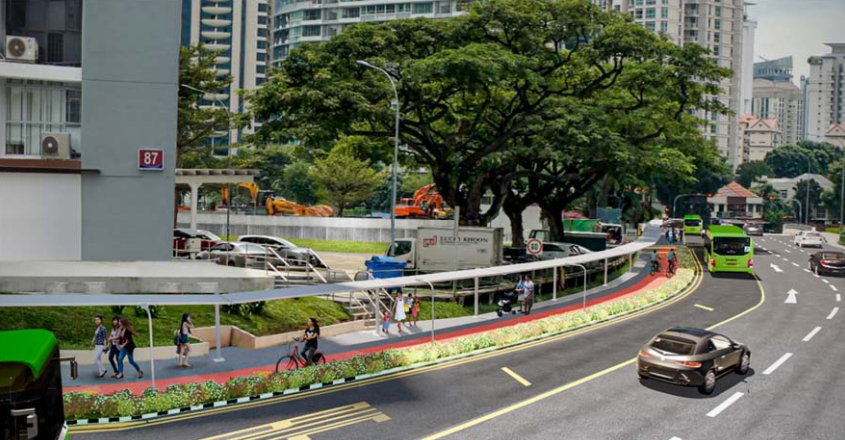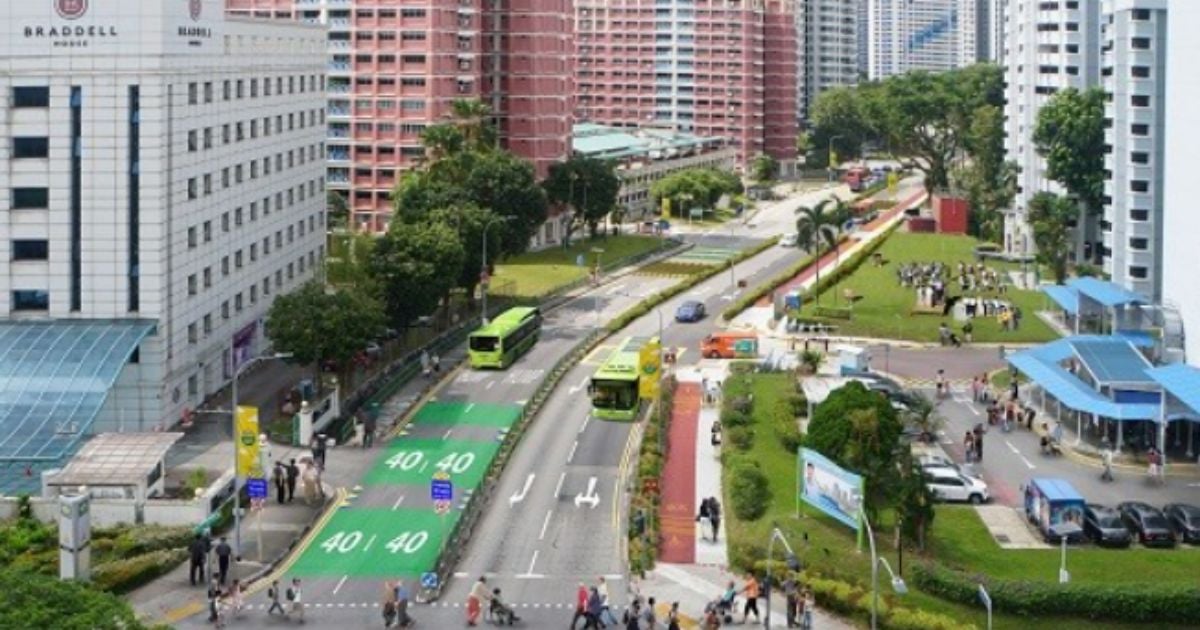As Singapore residents, many of us are grateful for the safety offered in this country. With a relatively low crime rate, a stable government, and the ability to walk home alone at night, Singapore is about as safe as it gets.
But as ACS students and alumni love to say, “The Best Is Yet To Be”.
Our streets are about to become even safer.
Walk, Cycle, Ride SG
Walk, Cycle, Ride SG is the Land Transport Authority’s (LTA) vision for an inclusive city with a transport system that enables everyone to take part in our lively city.
Walking, cycling and other greener ways to travel are made easier with more sheltered walkways, park connectors and measures for a car-lite city.
You wouldn’t want to walk in the rain if there are no sheltered walkways, right?
To facilitate Walk, Cycle, Ride journeys, as well as in support of Age Well SG, LTA will expand its Friendly Streets Initiative to more towns. LTA will also improve first-and-last mile connectivity with more commuter infrastructure.
LTA will receive additional funding of around $1 billion over the next decade to support these two initiatives. Additionally, LTA will fund two new road purposing projects to prioritise road space for pedestrians and cyclists.
The enhancements aim to create safer, more inclusive public spaces, and encourage active and sustainable modes of transport.
After all, active lifestyles and sustainability are all the rage right now.
Expanding Friendly Streets
Friendly Streets is a rather new term, so it’s not surprising if you’re not sure what it means.
Reader: Ya sia, Friendly Street means what? You say hi to everyone you see on the street?
The Friendly Streets initiative is co-created by LTA with the community. It makes daily journeys to key amenities – such as hawker centres, community clubs, schools, and MRT stations – in neighbourhoods safer, more convenient, and comfortable for those walking or cycling.
The features of each Friendly Street are customised to meet the specific needs of each area, such as raised pedestrian crossings, wider and more accessible footpaths, and signalised crossings with pedestrian priority.
Street signs, green road surface markings and road humps remind motorists to slow down when entering and driving along Friendly Streets.

Friendly Streets were announced in 2023 and started with five pilot towns with high pedestrian and cyclist flows, and are near key amenities – Ang Mo Kio, Bukit Batok West, Tampines, Toa Payoh and West Coast.
LTA has started works at Ang Mo Kio, Bukit Batok West and Tampines, and works for the remaining pilot locations will commence in the coming months.
Due to strong community support for the five pilots, Friendly Streets will be expanded to all HDB towns by 2030, as well as to private estates with high-activity areas and key amenities nearby.
Ten more towns will be covered in the next batch of Friendly Streets, namely Bedok, Buangkok, Bukit Panjang, Choa Chu Kang, Holland/Buona Vista, Jurong East, Pek Kio, Punggol, Sembawang and Tiong Bahru/Havelock.
LTA will begin engaging the community and relevant stakeholders in these areas later this year to determine the specific locations and features to be implemented.
Enhancing First-and-Last-Mile Connectivity (FLMC)
First-mile and last-mile connectivity (FLMC) refers to connectivity from the origin to the destination or can be defined as connectivity from a terminal to the desired destination via public transport.
In simpler terms, first-and-last-mile refers to the distance you cover between your house and a bus stop, then from your final bus stop to your final destination such as your office.
FLMC will be enhanced by LTA to improve barrier-free access and make walking to key public transport sites more convenient and comfortable.
The enhancements provide residents, especially seniors, with improved access to amenities and public transport nodes, and encourage them to lead more active lifestyles and stay socially connected.
The additional funding will enable LTA to enhance commuter infrastructure in the following three ways over the next decade.
First, senior-friendly features will be upgraded and implemented at more bus stops. The features include additional seats with arm and back rests, as well as ensuring wheelchair accessibility.
I know the seats with arm and back rests sound very comfortable but please don’t fall asleep there and make a poor aunty have to stand and wait for her bus.

Second, more covered linkways will be built to connect MRT stations to more Friendly Streets and some key amenities nearby that are largely within an 800-metre radius for more comfortable and convenient walking experiences.
Finally, I won’t be drenched if I forget to bring an umbrella.
Lastly, more pedestrian overhead bridges, particularly those near public transport nodes and healthcare institutions, will be retrofitted with lifts.
This provides barrier-free access and allows those with physical disabilities to utilise pedestrian overhead bridges instead of having to search for a traffic light or zebra crossing which may not be so close.
Efforts to retrofit lifts at pedestrian overhead bridges have been underway since 2013. To date, there are 87 existing pedestrian overhead bridges with lifts.
Locations that are expected to benefit a high number of seniors and commuters with mobility challenges are prioritised.
LTA said that more details about specific locations and measures to be implemented will be finalised subsequently.
Implementing new road repurposing projects at Zion Road and Sims Place
The Walk, Cycle, Ride experience will continue to be enhanced by road repurposing, which facilitates smoother connections between surrounding amenities.
Last year, LTA announced plans to pedestrianise an 80-metre-long stretch of the road along Choa Chu Kang Terrace and an 18-metre-long stretch at Yung Sheng Road. Works are ongoing at these locations and slated for completion by the end of this year.
The LTA will also embark on two more road repurposing projects this year at Zion Road and Sims Place.
Up to two of the five to six road lanes along Zion Road will be repurposed to feature a widened footpath and a new cycling path to connect Zion Road to the Alexandra Park Connector.
The 700m stretch being repurposed will enable LTA to expand the existing bus shelter opposite Great World City and provide sheltered connectivity for commuters to Zion Riverside Food Centre.

A 300m road stretch fronting Sims Vista Market and Food Centre will be repurposed from four road lanes to two, enhancing safety and convenience for the many pedestrians crossing Sims Place between Block 53 and Sims Vista Market and Food Centre.
There will also be a widened footpath and a new cycling path, as well as sheltered connectivity across Sims Place to facilitate residents’ journeys to the market and food centre.
If it rains, your dabao food won’t get wet.
These two projects are expected to begin later this year, and are set to be completed in 2026.
You know when you’re going home at night and someone zooms past you on a mobility scooter (they’re probably playing manyao music too) and scare the living daylights out of you?
Imagine how much scarier it feels for seniors.
This won’t happen anymore as some current users will no longer be able to use these devices, and the speed limit for such devices will be lowered in 2025.
The increasing public concerns over the misuse of mobility scooters by able-bodied people has prompted the government to make rules stricter.
The new rules will be in line with recommendations by the Active Mobility Advisory Panel (AMAP) to ensure paths remain safe for all users, while remaining inclusive to those with genuine mobility needs.
You can watch this video for more information:
From 2025, only users certified with relevant medical needs or walking difficulties will be able to use mobility scooters.
This requirement will not apply to users of manual and motorised wheelchairs, as feedback on misuse among able-bodied users is largely linked to mobility scooters.
To minimise inconvenience to genuine users of mobility scooters, the Ministry of Transport (MOT) said that persons with disabilities with mobility scooters subsidised under the Assistive Technology Fund (ATF), and seniors with mobility scooters subsidised under the Seniors’ Mobility and Enabling Fund (SMF) will be recognised as genuine users, and will not be required to obtain additional certification.
The speed limit of motorised personal mobility aids (PMAs) such as mobility scooters and motorised wheelchairs will also be reduced from 10km/h to 6km/h.
Since PMAs are intended for use as a replacement for walking, its speed limit should align with the typical brisk walking speed, said MOT.
Sufficient time will be provided for users and retailers to adjust to the new regulations.
Genuine PMA users may continue to use their existing devices (with a speed limit of above 6km/h) as long as they travel within 6km/h. MOT recommends these users to refer to the walking speed of other path users or use speedometers.
Currently, PMAs are restricted to 70cm width, 120cm length, 150cm height, and 300kg laden weight when used on public transport. PMAs used on public paths will be required to follow these dimension restrictions as well.
The changes above will be implemented next year, after the necessary legislative amendments are made.
“We will announce the specific timelines later, but let me assure Members that ensuring a smooth transition is a key priority,” said Senior Parliamentary Secretary Baey Yam Keng
On top of the changes to roads on the ground, there will be changes to the MRT system too. From new Thomson East-Coast Line stations to the completion of the Circle Line (yes, it will form a full circle), read all about the new changes in this article.
